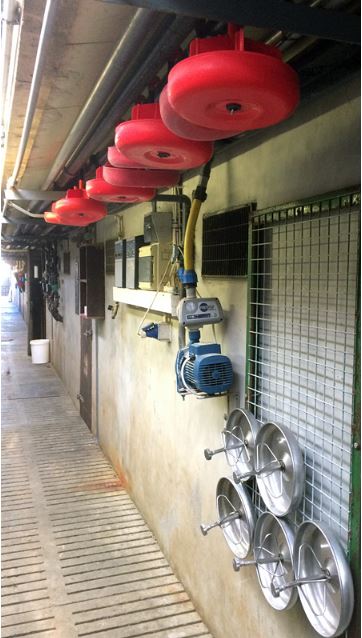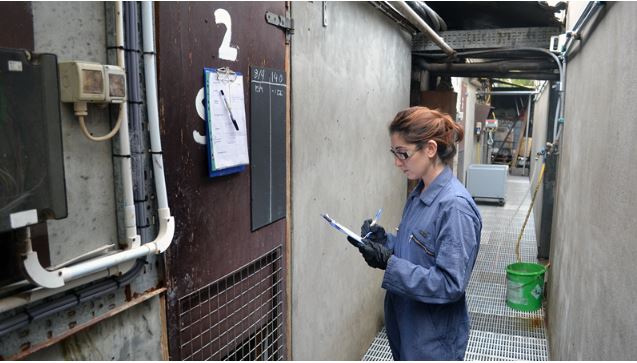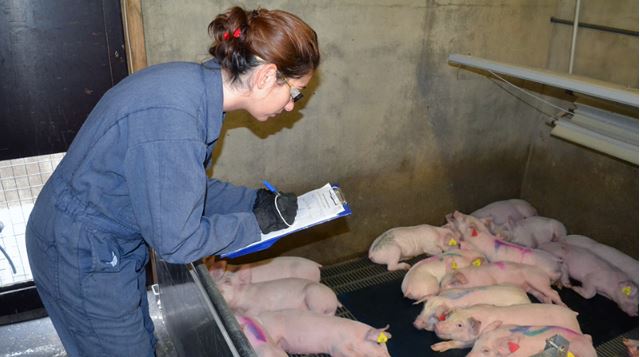- Home
- EU PiG – Adoption of biosecurity tool
EU PiG – Adoption of biosecurity tool
Producer Eugene Sheehan from Ireland has reduced pig production costs per kg slaughter weight by 9.3% and lowered antibiotic use by 90%, having been the first to use a new biosecurity scoring tool, Biocheck.UGent®.
Ambassador: Eugene Sheehan, Ireland
Publication date: May 2018
Theme: Health management
Challenges: Biosecurity
This tool helps farmers review their unit management as it scores different aspects of biosecurity and allows farmers to identify areas of weakness to address.
Eugene Sheehan and his son Ciaran, an animal science student at UCD (University College Dublin).
Eugene’s 300-sow farrow-to-finish unit was positive for PRRS, APP, Mycoplasma and influenza and previously had other problems, including diarrhoea, respiratory disease and meningitis.
The Irish Agriculture and Food Development Authority (Teagasc) adopted the University of Ghent Biosecurity Scoring Tool as part of its advisory services package to enable farmers to review biosecurity and improve performance on their farms.
Results
Eugene has implemented a series of management and biosecurity practices that have helped improve pig health and performance and reduce costs. Improvements enabled:
- Control of most of the respiratory and digestive problems and meningitis
- A reduction in the use of antibiotics of 90%
- Removal of zinc at therapeutic levels
- A reduction in days to slaughter of two weeks, with no change to final carcase weight
- Production costs per kg slaughter weight dropped from €1.66/kg down to €1.5/kg, a decrease of 9.3%
“Reduction in antibiotic usage is achievable but requires teamwork, perseverance and support.” – Eugene Sheehan
Adoption of Biosecurity Tool
A 300-sow farrow to finish unit adopted Biocheck.UGent®, the biosecurity coring tool. The tool enables farmers to review biosecurity and improve performance on their farm aiming for improvements in biosecurity to translate onto better pig health and performance.
Benefits
- Control of most of the respiratory and digestive problems and meningitis which was perviously an issue on farm
- Reduction in antibiotic use by 90%
- Removal of zinc at therapeutic levels
- Reduction in days to slaughter of two weeks, with no change to final carcase weight
- Production costs per kg slaughter weight dropped from €1.66/kg to €1.50/kg a decrease of 9.3%
Innovation in practice
The review and identification of problems on farms are important prior to taking action. Veterinarians, advisors and nutritionists, along with the farmer, were involved in the discussions to find the most cost-effective way of addressing issues on farm. As a result of these discussions, changes to Eugene’s farm included:
- Reduced stocking density in particular areas
- Changes in the flow of animals
- No longer mixing of piglets
- The introduction of footbaths and other hygiene measures
A key change was to build extra accommodation to have the right proportions between the different production stages and allow pigs the right space. Thus, the ‘all-in-all-out’ system is undertaken correctly, and the re-mixing of pigs is now avoided. Although this change required an initial investment, it paid off very quickly – seen in the 9.3% decrease in production costs per kg slaughter weight.
It took almost two years and lots of hard work to see the benefits of all the changes, but running the farm is now easier and more profitable.
For more information about the Biocheck.UGent®, biosecurity scoring tool visit their website.
Case studies
Technical reports
 EU PiG
EU PiG
The farm has been adapted to ensure the thorough cleaning, disinfection and drying of all materials
 EU PiG
EU PiG
 EU PiG
EU PiG
Clear instructions and blackboards are available on each door for all staff to be able to follow protocols and leave feedback.
Animal health best practice challenges
Use of slaughter data to improve health outcomes
African swine fever (ASF) biosecurity measures
Early warning of diseases and production errors
Influence of gut health on disease and production
Optimal vaccination strategies
Reducing antimicrobial medication
Contact us
To access more information, contact RPIG (Ireland): Ciaran Carroll or EUPig@ahdb.org.uk
This project has received funding from the European Union`s Horizon 2020 research and innovation programme under grant agreement No 727933.
 Government logo
Government logo

